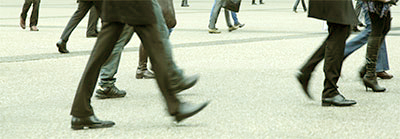The Pace of Modern Life
We live in a world of audio and video soundbytes, racing from one stimulus to the next. We switch quickly between radio, movies, YouTub
e and Instagram, Twitter and Facebook or television programs that range from comedy to dramaand tragedy to incredible amounts of violence and catastrophe. News coverage focuses on one tragedy after another, frequently over and over again without pause.
 When we find ourselves outside, we stroll through nature, we walk the streets or go to great places like museums and bookstores with our eyes instead glued to our cell phones.
When we find ourselves outside, we stroll through nature, we walk the streets or go to great places like museums and bookstores with our eyes instead glued to our cell phones.
What are we so concerned we’re going to miss?
“The Night Watch” by Rembrandt van Rijn, maybe?
We multi-task wherever we are. We get utterly absorbed in computer games or mobile apps. We have become a species that speeds down the highways and roadways of life not actually present to what surrounds us. We scan over tons of data everyday on our computer screens. We send texts and various forms of communiqué incessantly.
What is happening to us?
Our bodies respond to this pace by holding a simmering tension, one that builds in each step, with each movement, with each “next thing” that needs our immediate attention. Oftentimes, our muscles are tight and often strained, especially those muscles around the hands, neck, and shoulders.
The Cost of Today’s Many Distractions
It’s my observation that we are not aware of what we are no longer tuned in to, of what we are disconnected from, as a result of this nonstop, highly stimulating pace. “Social Media” is, yes, a new kind of connecting with others, but it’s also a form of interacting that leads to a less intimate way of connecting to others. It is fast replacing the more fundamental benefit of hearing someone, seeing someone, and registering that person live and in their energy, in front of you. And at the same time, we lose the opportunity to notice ourselves, our own pace and our own reactions, in the presence of another.
The Cure
It all comes down to this: We need to pause. As frequently as we can remind ourselves to do so, we need to. Pause and take notice of what we’re doing, what we are feeling, what’s around us that we are ignoring, and what’s there for us, in the present moment. What’s the pattern that we’re running at that moment? What’s the content of our thoughts and feelings? What’s to be felt in our body? What’s stirring in our spirit? Without expanding our pace by slowing it, we literally miss out on the most important moments to be had within ourselves, across our own lives, and in the world in which we live. We move farther and farther away from registering our own emotional response to things, which we subjectively experience as a feeling, which is how we, in the end, experience our lives.
“FEELINGS” are full of personal data that informs us of just about everything we need to study and learn about ourselves, including our heart’s desires, our joys and our sorrows, our having gone on automatic or having gotten defended, our sense of when we are being violated and our knowing of when we are loved. Tuning out our feelings means distancing our awareness from our authentic self as it is living in the present moment.
Before You Know It
In addition, a knee-jerk reaction to one of our basic, aversive emotions – fear, anger, and distress – fires up so rapidly and with such an intensity that we easily act out a defensive response before registering the aversive emotion at all. This is likely to happen even more often in this fast-pace, highly distracted, over-stimulated environment we are living in today. Is this what we want?
I bring us back to that pause. That pause that will allow us to experience our emotions in real time and actually engage with them, deal with them. Especially, one of the harder emotions, an aversive emotion like fear or distress or anger, which are directly linked to our fundamental needs for security, love, and self-worth. These are qualities of personal experience that yes, are sure fighting for. But, when we fight for something without awareness, without choice or conscious conduct, we often cut ourselves off from the very thing we are fighting so hard to protect.
“I’m Going In…”
To prevent this, we need to do the work of inquiry inside of ourselves. The kind of inquiry that enables us to discern the validity of one of our aversive emotions and the option to choose a variety of ways to respond effectively. We DO have a choice as to how we behave. That great pause is what gives us the freedom to choose a behavior, to choose an attitude, rather than simply acting out a pattern of reactions, also called “going on automatic.”
Roots of Pace and Pause
So take a moment to look at your pace. Take a moment to focus on where you put your attention on a daily basis. What’s the benefit of moving so fast and not tuning in? What’s the downside? There is such an unyielding impetus in our culture to “get ahead,” be a success, make more money, and win. Technology aids and abets the multiple demands we find ourselves trying to manage and sort. But what kind of human does that leave us being?
 This week, take a moment each day, at least once a day, to track your pace. Track how attentive you are to others. Track how much anxiety you feel in your body trying to to do more than two things at once. Track the discomfort you feel when you can’t get to that video game or you’ve not gotten a reply to a particular text. Put your phone down for two hours and observe how you feel about it. Let it ring and ding and announce a new instant message without your running to see who or what it is. LET IT GO for a while. See what happens. Observe yourself as you pause…
This week, take a moment each day, at least once a day, to track your pace. Track how attentive you are to others. Track how much anxiety you feel in your body trying to to do more than two things at once. Track the discomfort you feel when you can’t get to that video game or you’ve not gotten a reply to a particular text. Put your phone down for two hours and observe how you feel about it. Let it ring and ding and announce a new instant message without your running to see who or what it is. LET IT GO for a while. See what happens. Observe yourself as you pause…
What Do You Think?
What are your thoughts and feelings about today’s rapid, highly stimulated pace?
Share your own experience of being able, or not, to actually pause and witness? Easier said than done.
Can you do it?
What helps you expand your awareness to include a slower pace?
Look forward to hearing from you.
12 Archived Responses to “The Pause in a Fast-Paced Day”
Anonymous says:
June 4, 2016 at 5:00 am
Your big heart-full-ness comes through to me most when you express from your own humanness how big a commitment it is to live our lives fully each day. Pausing, soaking in the beauties of life really balances out my automatic angst, worry, and catastrophizing that is my reptilian brain’s “warning light” that tries to grab my attention at any moment. Learning to recognize a whole body/mind/spirit relaxation after pausing is SO helpful. Thanks for that truth, David!
David Daniels, MD says:
June 8, 2016 at 1:41 pm
Hi Anonymous, And thank you for your wisdom. The pause is so so important otherwise we are just on automatic. Warmest regards, David
David Daniels, MD says:
June 10, 2016 at 9:36 am
Thank you Anonymous;
Yes, the pause is key to doing our work, the work of coming home to ourselves and to all that there is. Warm regards, David
Anonymous says:
May 15, 2015 at 9:41 pm
Your simple yet eloquent writing cuts right to the chase and is both a reinforcing and needed reminder of this truth. Since returning from my Enneagram training marathon at Menlo Park in February, I am fascinated to observe the dance between my 6-ness and my Type 3 husband – the good stuff AND the places where we get stuck. Being able to consciously observe and understand the Type 3, go-ahead energy, its gifts and pitfalls have been enlightening, and I can clearly see and agree with your blog: how the gift can become a curse without awareness and a pause to make conscious choices. I certainly see this in myself when I am doing my own “Type-3 dance;” however, I’m happy to say I occasionally remember to breath when I am driving now!! Warm regards, David
David Daniels, MD says:
June 11, 2016 at 4:50 pm
HI, What a lovely response. We all need the gift of time and grounded presence with awareness. As you say it changes the world and your view of self and other. Keep up the good growth. Warmest regards, David
Anonymous says:
April 22, 2015 at 4:44 am
Hello David,
Here it is 4:30am and I have been up since 3:30am racing through my emails and jotting down notes to try and make my day easier to handle. Then I run across your email and article and actually stop and take a deep breath. Your words always strike me with such profound wisdom and yet simplicity that I have unconciously left behind because of my need to keep up and achieve. Thank you for allowing me to PAUSE and remember who I am and what I feel. What a joy to feel free to just BE. Miss you and hope to connect soon.
Love,
Jan
David Daniels, MD says:
April 25, 2015 at 10:14 am
Thanks Jan, While it helps to have a regular breath practice because in time it allows state change to receptive and present faster, it id not net necessary. Just pausing several times a day, 3-6 times, for a minute or so to breath back in and down can be very useful for us to notice and manage our pace, pause, and presence. Warm regards, David
Anonymous says:
April 26, 2015 at 1:34 pm
Thanks Jan, And this pace keeps us away from receptive energy/force which is so great a part of or lives and being. Just stop a few times a dray and breath down and in to get centered and grounded then open you heart ago just receiving. It is not passive it has a way of reaching out in contact with others. Warm regards, David
David Daniels, MD says:
June 11, 2016 at 4:57 pm
Thank you 3:30 AM ariser, Yes the pause is so so vital and just breathing down and in to get receptive and release from judgment is vital at all of us. Warmest regards, David
Anonymous says:
April 21, 2015 at 4:12 am
Thank you David!
For a very important blog. It made me relax a little just by reading it. As a Seven I tend to be one step ahead of myself whenever I don´t consciously remember not to. Thanks for reminding me today!
Tina
Anonymous says:
April 16, 2015 at 1:12 pm
Hi, David,
Thanks for your words of wisdom. I agree entirely. Yes, easier said than done. While I do my best to maintain that awareness throughout the day, I think that sitting meditation helps me experience it better than anything else, although Karen’s and my walks and hikes, as well as other special times together are at least a close second.
Thanks again. Frank
David Daniels, MD says:
April 17, 2015 at 9:47 am
And thank you Tina, Awareness is the first step. I suggest even just stopping for 1 minute 3-6 time a day to reflect on pace and pause, to center and ground and then reflect on pace and pause with an open heart. Notice what you energy is like and if you have been receptive to others, self, and the world.
David



